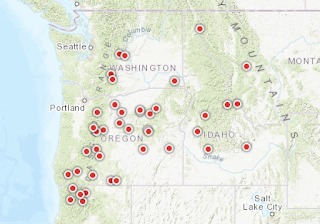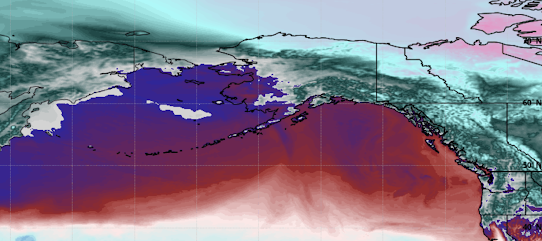We are in the middle of one of the extreme cold periods in Northwest history.
Many locations are breaking daily and MONTHLY records for coldest maximum daily temperatures in April. And to drive the point home, snow showers were observed around Seattle (see a WSDOT image from Auburn this morning).
Let's consider two-day average temperatures for April. The last two days were the COLDEST at Seattle in April for the entire record (77 years).
Daily and monthly records are falling throughout the region. Consider Monday, April 11..
Daily records for the coldest high temperatures fell over the region (see below)
More impressively MONTHLY records also fell that day.
What about the low temperatures today?
Below freezing all over Washington and Oregon with teens in the mountains. This is April folks...we are experiencing late December temperatures.
Want temperatures even MORE extreme? The western slopes of the Rockies were in the single digits and even below zero this morning.

Incredibly, the daily high temperatures have barely risen to the normal low temperatures for this time of the year.
Even more impressive, the record cold we are experiencing now is nearly as unusual as the heatwave last June. But where are the attribution reports? The media stories about the record cold?
Want warmer temperatures? You might try Siberia! Believe it or not, it has been warmer in eastern Siberia than in portions of our region (see below, showing temperatures tomorrow mornng)
This cold spell is associated with an unusually deep trough of low pressure over our region. There is the result of natural variability--there is no reason to expect global warming/ climate change has anything to do with it.
As illustrated by a figure created by US EPA, cold waves are declining around the western U.S.--EXACTLY what you would expect with global warming.
_______________________
Reminder: I will do a special session for this blog/podcast's Patreon supporters on Saturday at 10 AM. Come with your questions....and I will talk more about the cold wave.













The first three days of April 1920 averaged under 38 degrees with measurable snow on each day.(2.4" total) And this was at a warmer location--Downtown Seattle-- versus 450 feet up at Sea-Tac.
ReplyDeleteAfter these last few days, it feels like the heat spike we had last Thursday happened back in the fall. I guess we're not quite past the point in the spring in which we can get away with a nice day or two without experiencing payback.
ReplyDeleteAt this point last year, we were just starting to embark on a week-long stretch of just about the best mid-April weather we could ask for. Right now, just getting to the seasonal average would feel a little bit like a victory.
My location's average high this time of year is 57. A lot of days we're only getting into the mid-40's. I made sure to take advantage of the 53 we hit last Saturday to spend extra time outside to enjoy the "warm weather."
DeleteSeasonal average temperatures would feel very balmy right now indeed!
And winter is holding on with a vengeance for folks in the mountains.
I agree- totally. I wish I'd gone to Hawaii now, instead of later this summer as planned so I could join a group. For those of us who live here, there's just no quick escape from this type of weather. Eastern Washington is often suggested, and it may be sunnier, but not warmer until at least May. And my seedlings? I may have to start over. Yes- This is the sort of thing that makes me want to move away.
DeleteYes, this is the kind of weather that makes at least one long-time Seattle area resident start to consider the possibility of leaving the region. When the gray, damp, cool weather stretches from October through April, and the new norm for this area is hotter, smoke-filled summers, I'm not sure it makes sense to stick around any longer.
ReplyDeleteHaving lived here for 47 years, smoky summers in Puget Sound have most definitely been a recent phenomenon, becoming really bad in summer 2017 I believe, and happening almost every summer since then. You can ignore the news all you want, but somehow that doesn't clear the air.
DeleteWas a firefighter on both east and west sides from 1974-1987.. trained in fire behavior at Boise Interagency Fire Center (BIFC) in the 1980's. Remember news watchers, that west side wildfires are mostly human caused. The population of the west side of WA has slightly more than doubled since '74. Furthermore, arson has been the cause of substantial numbers during recent fire seasons. Last summer i counted 13 spot fires (extinguished) between Kelso and Olympia in July. DOT actually blamed this on dragging trailer chains. Anyone who understands organic fuels and fire behavior knows that this assertion of trailer chain fires is ludicrous. The distance between the brown grass and the fogline is substantial... far past the distance a spark from a trailer chain would travel. Winds were from the NE on the day at least 3 of these I-5 fires occured... from a trailer spark created perhaps 15 feet to the west. Ridiculous. Blame people, not climate change.
DeleteThank you for some actual, on the ground experience, Mike. Cliff has also pointed out that the rapid expansion of non - native grasslands (I think it's Cheatgrass?) has also contributed to the increasing incidence of wildfires. That also would appear to be human - caused.
DeleteAfter 38 years I am ready to leave this has been the toughest winter in memory when you lump in two years of pandemic. Only thing that makes this place special is rare times of “nice” weather. I can come back on vacation if I like but the SW is calling.
DeleteGrand solar minimum?
ReplyDeleteAnother historic event, I only fear another historic heatwave this summer don't be surprised if it happens, be prepared.
ReplyDelete"Even more impressive, the record cold we are experiencing now is nearly as unusual as the heatwave last June."
ReplyDeleteI'd like you to expand on this remark, Cliff. Perhaps in a future blog?
> This cold spell is associated with an unusually deep trough of low pressure over our region. There is the result of natural variability--there is no reason to expect global warming/ climate change has anything to do with it.
ReplyDeleteIt seems logical that arctic amplification would cause more variability in the polar vortex, which would make unusually deep troughs more usual, no?
Earlier this week, I pulled my Carhartt winter work jacket out of the back part of our closet where I had put it away at the end of March thinking cold weather was over.
ReplyDeleteMore important, I retrieved our bee hive insulators from where we store them and put them back on our hives, also having removed them from our hive colonies at the end of March.
For whatever reason, honey bees and wasps don't have a taste for me. When I was outside this week, some of them landed on my bare hand to get warm. They land on me in the summer too when it's very hot outside and they decide they need to take a drink of sweat from my bare arms.
As long as I don't swat at them, the bees and the wasps do what they came to do and then go on their way.
Does the weather this Winter and early Spring provide any insight into what Summer will look like this year? eg. less chance of heat dome, etc?
ReplyDeleteHaving lived here for all of my 75 years...I agree that our "Spring" season seems to have elongated itself...as mentioned above, the ground does not have enough warm Spring weather to help with evaporation...and Summers--that used to usher in warmer temps--even with occasional rainy June stuff--do not really crank up until July...then again, Summer frequently extends into October!...That seldom happened when I was a kid, in the 1950s!..But all in all, I love our unpredictable, but mostly moderate, weather.
ReplyDeleteI distinctly remember during spring vacation in the mid 60s a snow event that lasted almost the entire week in Bellingham. It didn't snow each day but the snow stuck around for days. We were in snow gear, mittens and boots. It may have been earlier in April than the current trend.
ReplyDeleteWhere did you get that data from, Cliff? I'd like to pull up April cold records for Portland.
ReplyDelete